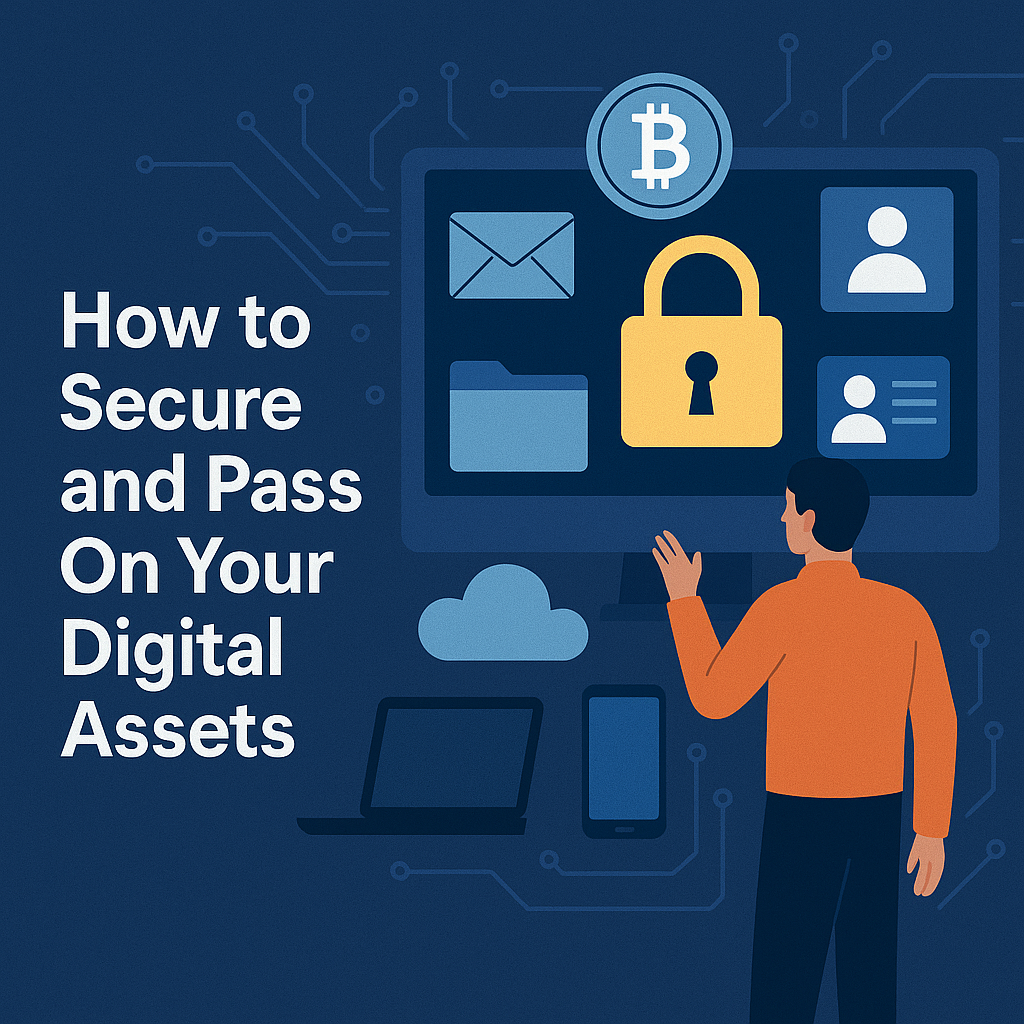In today’s world, your estate isn’t just physical — it’s digital. From cryptocurrency to cloud photos and email accounts, digital assets hold real emotional and financial value. Yet, over 70% of Americans leave no instructions for their digital property, risking permanent loss after death.
What Are Digital Assets in Estate Planning?
Digital assets are anything you own or control online that requires login access or holds value. They include:
- Financial: Cryptocurrency, PayPal, Venmo, investment apps
- Personal: Cloud photo libraries, email, online storage
- Professional: Business websites, e-commerce stores, monetized YouTube or TikTok accounts
- Legacy: Digital documents, wills, social media, domain names
According to a 2024 AARP survey, the average person maintains over 90 active online accounts, many containing financial or sentimental assets. Without proper planning, executors can’t access them due to strict digital privacy laws.
Why Most Digital Assets Are Lost Forever
Under the Revised Uniform Fiduciary Access to Digital Assets Act (RUFADAA), executors and heirs can’t legally access digital accounts unless explicitly authorized in a will or secure record. Under RUFADAA, fiduciaries can access certain digital assets if you granted consent in an online tool or estate documents; absent consent, access may be limited. This is why it’s crucial to plan ahead.
Common pitfalls:
- Passwords lost in old notebooks or devices
- Two-factor authentication preventing access
- Cloud data deleted after account inactivity
- Crypto wallets lost due to missing keys
> “When a person passes without documenting credentials, executors face locked accounts and vanishing data. Families can lose irreplaceable photos, investments, or intellectual property.” — National Law Review, 2024
Step-by-Step: How to Protect and Pass On Digital Assets
Step 1: Create a Complete Digital Asset Inventory
List every online account and asset, including:
- Account names, platforms, and URLs
- Type of asset (financial, personal, or professional)
- Location of backups or wallets
- Who should inherit or manage it
Bigtoa’s Digital Vault lets you securely record all of this in one encrypted dashboard.
🔒 Manage Your Digital Assets Securely →
Step 2: Store Passwords and Access Keys Safely
Avoid storing credentials in text files or unsecured notes. Use:
- Password managers (e.g., Bitwarden, 1Password)
- Encrypted digital vaults like Bigtoa
- Backup recovery phrases for cryptocurrency
Bigtoa encrypts your entries using AES-256 encryption — the same level trusted by banks — and allows time-limited sharing with executors or heirs.
Step 3: Include Digital Assets in Your Estate Plan
Work with your attorney to reference your digital assets inventory within your will or trust.
Specify:
- Who inherits which assets
- Who can access accounts posthumously
- Where they can find your inventory
You can name your executor in Bigtoa and allow them controlled, read-only access.
Step 4: Set Up Legacy Access Options
Many major platforms now provide built-in estate tools:
- Apple: “Legacy Contact” for iCloud and devices
- Google: “Inactive Account Manager” to transfer data
- Facebook: Memorialization settings for profiles
Still, those features are limited — they don’t cover all accounts. Bigtoa’s unified inventory ensures every password, account, and instruction is in one place.
Step 5: Keep Your Digital Inventory Updated
The digital world changes constantly. Set a reminder every six months to:
- Add new accounts
- Update passwords or 2FA methods
- Remove closed or inactive accounts
Bigtoa automatically timestamps changes, so your heirs always receive the most current information.
The Hidden Value of Digital Assets
Digital property isn’t just financial — it’s emotional. Photos, creative work, or social media archives are often priceless to families.
A 2023 report by the Digital Legacy Association found that 1 in 3 families lost access to cherished photos or documents after a loved one’s passing due to lack of preparation.
With a structured inventory, you ensure those memories and assets don’t disappear forever.
Why Use Bigtoa for Digital Estate Planning
Bigtoa simplifies the complex task of organizing digital life:
- 🔐 Bank-grade encryption for account and credential storage
- 👨👩👧 Controlled access for heirs or executors
- 📁 Uploads for files, keys, and documents
- 🕓 Time-limited permissions (e.g., 30-day executor access)
- 📜 Integrated estate planning features for full legacy coverage
Start Your Digital Asset Inventory →
Digital Estate Planning FAQ
What counts as a digital asset?
Anything stored online or requiring login access: email, crypto, websites, documents, photos, or social media.
Can my family legally access my online accounts after I die?
Not without authorization. RUFADAA laws protect digital privacy. Use tools like Bigtoa to grant legal access in advance.
Is cryptocurrency part of my estate?
Yes. Without recorded wallet keys or backup phrases, crypto assets may be permanently lost.
How secure is storing this data online?
Bigtoa uses AES-256 encryption and zero-knowledge architecture, meaning even Bigtoa staff cannot view your information.
Can I include my online business or domain names?
Absolutely. Include ownership details, registrar info, and renewal instructions to prevent loss of digital property.
Final Thoughts
Your online presence is a real, valuable part of your legacy.
By cataloging your digital assets today, you spare your loved ones from stress — and preserve the digital footprint you’ve built over a lifetime.
> Protect your digital life. Ensure your legacy lives on — securely, clearly, and completely.
Create Your Digital Asset Inventory with Bigtoa →
References
- National Law Review. Digital Estate Planning: The RUFADAA Revolution. 2024.
- AARP. Online Accounts & Digital Legacy Report. 2024.
- Digital Legacy Association. Preserving Memories in the Cloud. 2023.
- Pew Research Center. Americans’ Digital Privacy Habits. 2024.

